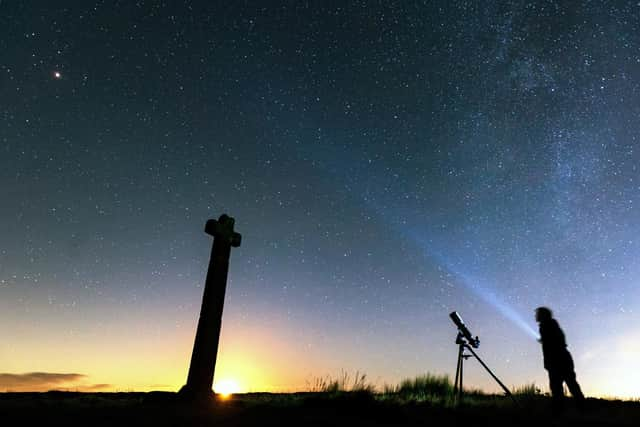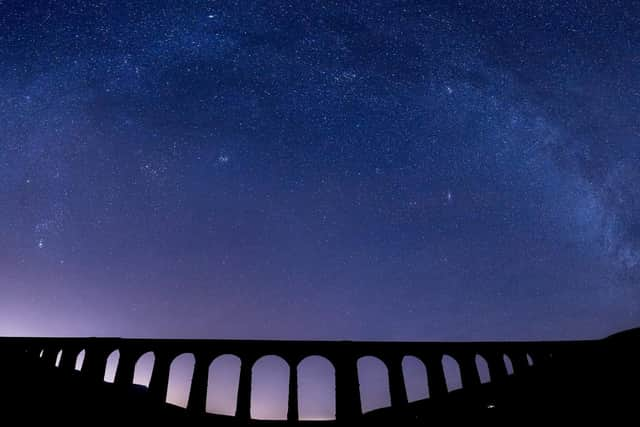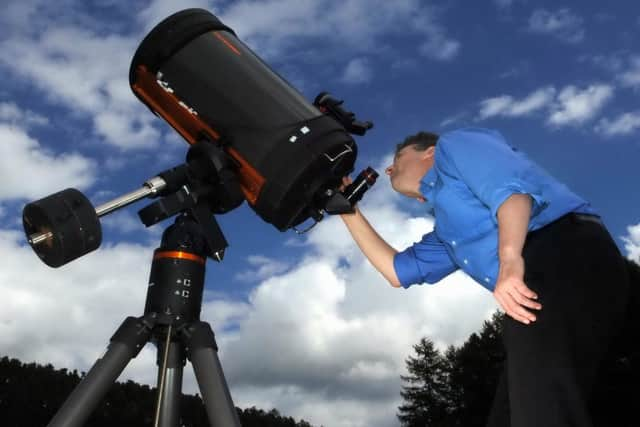As the Dark Skies Festival makes a 'virtual' return we look at why this is an exciting time for stargazing in Yorkshire
“My brother and sister bought me a telescope and I could only have been about six years old. It was a tiny little telescope and that got me started. It was around the time of the later Apollo moon missions and space exploration was headline news and it just caught my imagination, and I’ve been doing it ever since,” he says.
This was 50 years ago when he was a young lad living in Barnsley. Today, Richard still lives in the town but these days the telescopes he uses are a tad more powerful.
Advertisement
Hide AdAdvertisement
Hide AdNot that you need fancy equipment to enjoy the wonders of the night sky. “It’s funny, some people buy expensive telescopes and then they go somewhere dark in the Yorkshire Dales or on the moors and they tend to stand by their equipment and look up with their own two eyes,” he says.


And when it comes to stargazing, Yorkshire is one of the best places there is. This reputation was boosted late last year when the International Dark-Sky Association designated both the Yorkshire Dales and North York Moors National Parks as International Dark Sky Reserves, allowing them to join an exclusive global family of locations renowned for astronomy that includes the Grand Canyon and Death Valley National Parks in the US and NamibRand Nature Reserve in Namibia.
Securing this status was the culmination of five years of work, part of which was down to the success of the dark skies festivals, which started in 2016. This year, a Virtual Dark Skies Festival programme of online events (running from February 12 to 28), has been created by the Yorkshire Dales and North York Moors National Parks together with Go Stargazing, featuring everything from moon watching safaris to scientists discussing the latest developments in space, including the impending landing of NASA’s Perseverance rover on Mars.
Richard Darn is a keen amateur astronomer and has been involved with the festivals since their inception, and though he concedes it will be different this time, he says there are still plenty of things that people can get involved with.
Advertisement
Hide AdAdvertisement
Hide Ad“We can’t meet up and have what we call a big ‘star party’, but people can still go out into their back gardens and what we can do is empower them with knowledge and enthusiasm, not that we need to do much of that because stargazing has been popular for so long. I’ve been involved in astronomy all my life and it’s just grown and grown. It’s become more acceptable to say you’re a keen stargazer than it used to be.”


This interest has been fuelled by the likes of Professor Brian Cox and TV shows such as Stargazing Live and Wonders of the Universe, that have brought the subject to a wider audience.
Carole Haswell is Professor of Astrophysics and Head of Astronomy at The Open University and is among the guest speakers at this months’ festival. Her online talk – Planet Discoveries Inspired by Star Trek – will revolve around exoplanets and how they are found, focusing on rocky planets orbiting nearby stars, as well as the prospects of discovering life on recently-discovered planets.
“One of the reasons I volunteer to do these public talks is to show young people now that it is perfectly possible to have careers doing this sort of thing, because we’re really in a golden age for science and that’s become very clear over the past year when it’s really been science to the rescue with the vaccine,” she says.
Advertisement
Hide AdAdvertisement
Hide AdProf Haswell, who grew up in Saltburn, believes festivals like this are important. “Last year in February I did an event near the coast in the North Yorkshire Moors area and we had a group from a primary academy in Middlesbrough. These were children from a deprived socio-economic background and for them part of the thrill was just being in the countryside. We looked at the moon through telescopes and I hope next year we will be able to do more things like that.”


It’s something Richard Darn has his fingers crossed for, too. “There’s no substitute for taking people out under a dark sky. You can’t replicate that immersive experience, but going online means people who don’t live anywhere near Yorkshire have been able to join in. We’ve had people from the other side of the world, people who might know of the Dales or the Moors through TV programmes that have logged on. So it’s another way of projecting the region and our dark skies.”
It could have a role to play in the economic recovery post-covid. It’s estimated that dark skies tourism is worth £25m a year to Northumberland, which gained Dark Skies status in 2013. “Astro tourism is a real branch of tourism, it’s like people going on walking holidays or boating holidays,” says Richard.
This bodes well for Yorkshire with over a third of the county now under Dark Sky designation. This will present a bounty of opportunities, but campaigners and scientists are keen to point out that the night sky is a valuable resource and one that needs protecting, especially from light pollution which can have a detrimental impact on nocturnal wildlife.
Advertisement
Hide AdAdvertisement
Hide Ad"The collapse of the insect population is at least in part down to light pollution. Bats, owls and even small fish can all be susceptible to too much light in the wrong places,” says Richard.
"We all need light because people need to live and work, but the quality of light is often very poor and it shines upwards rather than downwards and is too intense. So there’s a lot we could do and still live with all the advantages of light and not its disadvantages.”
The use of artificial light has increased dramatically in recent decades as urban areas have expanded “From the middle of Sheffield you’ll be lucky to see more than 20 stars and it’s the same for Leeds and Bradford,” says Richard. “But once you get to the edge of those cities you notice the stars start to come back and when you get to the darkest parts of Yorkshire you’re talking about two-and-a-half thousand stars and the possibility of seeing the Northern Lights.”
He says you don’t have to go too far to experience stargazing in all its glory and recalls a memorable night a couple of years ago when he hosted a small event up at Keld, in Swaledale.
Advertisement
Hide AdAdvertisement
Hide Ad"We were at a resource centre where I gave a talk. It was cloudy but we popped outside to see if we could see anything and there was a couple from Darlington who had never seen the Milky Way and were hoping to see it.
"Then all of a sudden the clouds just parted and the Milky Way appeared etched above them, and this couple were absolutely thrilled. It was just one of those moments that happen from time to time, and they didn’t have to go anywhere exotic, they didn’t have to go to Chile or South Africa, they could see it 20 miles from where they lived.”
For centuries humans have gazed up at the heavens and wondered what lies beyond, and this innate curiosity has never left us. “There’s this idea that you can almost reach up and touch the stars and I know what people mean by that,” says Richard.
“There have been a lot of studies into the therapeutic effects of being in and around green spaces and I would say night skies can boost wellbeing too, because there’s that sense of being at one with nature… and sometimes your eyes are all you need.”
The Virtual Dark Skies Festival runs from February 12-28. The programme is a mix of free and paid-for events. More details at www.darkskiesnationalparks.org.uk